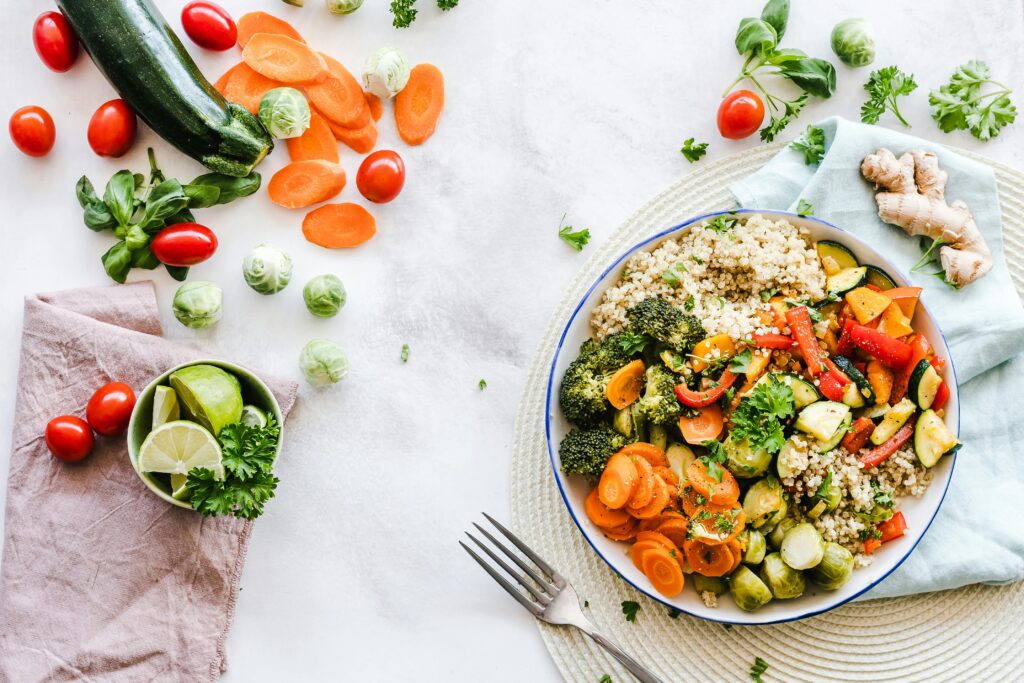,
Before Climbing: Fueling for Performance
Your body requires a mix of carbohydrates, proteins, and healthy fats to perform at its best during a climb. The goal of pre-climb nutrition is to ensure your muscles have enough energy to sustain your effort, while also keeping your blood sugar levels stable to avoid fatigue or energy crashes.
,
,
1-2 Hours Before Climbing: The Ideal Pre-Climb Meal
If you’re climbing in the morning or mid-day, it’s best to eat a balanced meal about 1-2 hours before you start. Focus on easily digestible foods that provide a steady release of energy. Here’s what to include:
- Carbohydrates: These are the primary fuel for high-intensity activity. Opt for complex carbs, such as whole grains, oatmeal, brown rice, or sweet potatoes. They release energy gradually, keeping your blood sugar levels stable throughout your climb.
- Protein: Protein helps repair muscles and provides a secondary energy source. A small portion of lean protein like chicken, tofu, or eggs can be perfect.
- Fats: Healthy fats, such as avocado, nuts, and seeds, can provide sustained energy, but keep portions moderate, as too much fat can slow digestion.
- Hydration: Drink plenty of water before you start climbing. Aim for at least 16-20 oz in the 1-2 hours leading up to your session. If you’re climbing in a hot environment, consider a drink with electrolytes to replenish lost salts.
,
Pre-Climb Meal Ideas:
- Whole wheat toast with almond butter and banana slices
- Greek yogurt with mixed berries and granola
- Oatmeal with a scoop of protein powder and a handful of nuts
,
30-60 Minutes Before Climbing: A Quick Energy Boost
If you’re in a rush or climbing after work, aim for a smaller snack 30-60 minutes before you hit the wall. This snack should primarily focus on carbohydrates, with some protein, and should be easily digestible. Avoid heavy meals or those high in fat or fiber as they could cause discomfort during climbing.
- Fruit: A banana, apple, or orange provides quick-digesting carbohydrates and natural sugars for an immediate energy boost.
- Energy Bars: Choose bars that are low in sugar and contain a balanced mix of carbs and protein.
- Smoothies: A fruit-based smoothie with a scoop of protein powder or Greek yogurt is an excellent choice. The liquid form makes it easier to digest quickly.
,
Quick Pre-Climb Snack Ideas:
- A banana or apple with a handful of almonds
- A granola bar with oats and nuts
- A smoothie with mixed berries and protein powder
After Climbing: Recovering with Proper Nutrition
The post-climb period is crucial for muscle recovery and replenishing your energy stores. After intense physical activity, your muscles need to repair and rebuild, and your glycogen stores need to be refilled.
,
Post-Climb Nutrition: The First 30 Minutes to 1 Hour
The first 30 minutes to 1 hour after your climb is the “anabolic window” where your body is most receptive to refuelling. This is the time to provide a combination of protein and carbohydrates to kickstart the recovery process.
- Protein: Post-climb protein helps repair muscle tissue that has broken down during the climb. Aim for at least 10-20 grams of protein within the first hour. A protein shake or a high-protein snack is ideal at this stage.
- Carbohydrates: After intense climbing, your muscles need to replenish the glycogen that was used. Include fast-digesting carbohydrates, such as fruits or whole grains, to quickly restock glycogen levels.
- Hydration: Rehydrating after climbing is essential. You’ll need to replenish the fluids lost through sweat. Aim to drink at least 16-20 oz of water right after your session, and consider an electrolyte drink if you’ve been climbing in hot conditions.
Post-Climb Meal Ideas:
- Protein smoothie with whey or plant-based protein, banana, and almond milk
- Chicken and quinoa bowl with roasted veggies
- Tuna or chicken salad with leafy greens, avocado, and whole-grain crackers
,
2-3 Hours After Climbing: A Balanced Meal to Promote Recovery
If you’re hungry after your post-climb snack, a full meal 2-3 hours later should consist of balanced macronutrients—carbs, proteins, and fats. This will help replenish your glycogen stores, maintain muscle recovery, and support overall recovery.
- Lean Protein: Grilled chicken, fish, lean beef, or plant-based options like beans or lentils are great sources of protein to continue the muscle repair process.
- Complex Carbs: Whole grains like brown rice, quinoa, or whole wheat pasta, and starchy vegetables like sweet potatoes provide long-lasting energy.
- Healthy Fats: Avocados, olive oil, and nuts are good sources of healthy fats that contribute to the overall nutritional balance.
Full Post-Climb Meal Ideas:
- Salmon with sweet potatoes and steamed broccoli
- Grilled chicken, brown rice, and avocado salad
- Lentil stew with whole-grain bread and a side of leafy greens
Additional Tips for Climbing Nutrition:
- Listen to Your Body: Everyone’s nutritional needs differ, so experiment with different foods and timings to see what works best for you.
- Avoid High-Sugar Snacks: It’s tempting to reach for sugary snacks or energy drinks, but they can lead to energy crashes. Focus on nutrient-dense, whole foods instead.
- Don’t Forget About Micronutrients: Climbing places stress on your bones and joints, so getting plenty of vitamins and minerals (especially calcium, magnesium, and vitamin D) is essential for long-term performance.
- Consider Supplements: Some climbers may benefit from supplements like BCAAs (branched-chain amino acids) to help with muscle recovery or electrolytes if they sweat a lot during climbs. Always consult with a healthcare professional before adding new supplements to your routine.
Conclusion
Nutrition plays a vital role in maximizing your performance and recovery as a climber. Whether you’re preparing for a big climb or recovering after a hard session, what you eat before and after matters. With the right balance of carbohydrates, protein, and fats, along with proper hydration, you’ll be fuelling your body for success both on and off the wall. So, next time you head out for a climb, make sure your nutrition is part of the plan!
Happy climbing!

